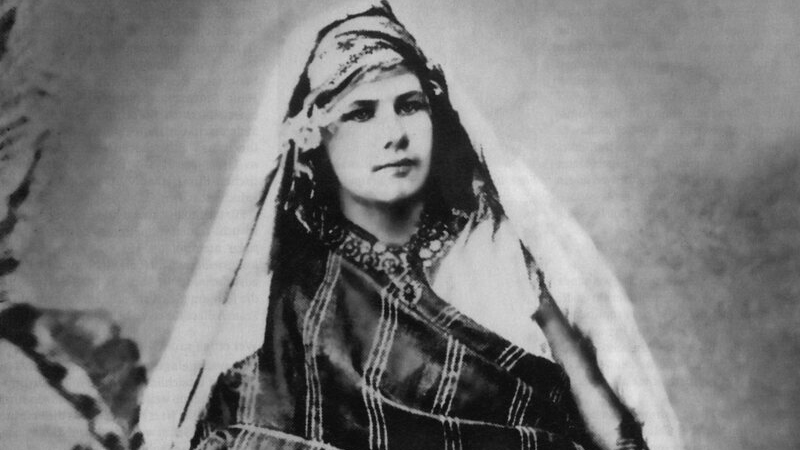“Cossack in the Saharan Wilds,” “adventuress” and “gifted writer”—different authors have applied various epithets to Isabel Eberhard, in whose unusual fate there is much that remains intriguing and mysterious.

She was born in Geneva in 1877 to an aristocratic family with German roots, who had previously moved there from St. Petersburg. She received a wide-ranging education at home, learned to speak three languages and, influenced by the romantic Orientalism that was then in fashion, became fascinated by the East. At the age of 18, she published her first short story on the Orient in a Parisian magazine, and soon traveled to Algeria, then a French colony. The “hundred lords”—a group of magnates who owned the lands seized from the indigenous population—in effect ruled the country. Of course, not every European in Algeria was destined for a rich life.
But Isabel did not aspire to find a place among the colonial elite. Instead, she took a step that shocked the Europeans in the region, embraced Islam and joined the Sufi brotherhood, with the blessing of a prominent marabout, or scholar of the Qur’an.
The zawiya opened its doors to the European woman, initiating her into its closed atmosphere and into its mysteries. The young woman adopted the lifestyle of the desert nomads, traveling with caravans across the Sahara, in Algeria, Tunisia and Morocco. During one of the crossings, she met and married a young Algerian man.
Shortly afterwards, Isabelle’s parents died, and she found herself left without a means of subsistence, and, forced to somehow earn a living, she became a reporter for a number of local newspapers.
A correspondent for Algerian publications (among them the liberal “Akhbar”), she sent reports from her “sorties” into the Sahara, revealing to her reader little-known aspects of the everyday life and traditions of the desert dwellers. Isabella was deeply engaged with the social problems that afflicted the native population. Thus, in one of her essays, she boldly stands up in defense of a group of rebellious peasants who were being prosecuted.
Her journalism revealed a genuine literary talent, and from articles and sketches she moved on to short stories. Most of them are inspired by the romantic worldview of the author, who sought her ideal and her refuge in the wilderness, and in a circle of people for whom the values of simplicity, frankness and trust reigned supreme.
In her stories, along with her description of the Bedouin way of life and customs, readers can see her desire to get below the surface of Muslim society and truly understand it, and to portray its realities without embellishment. Nevertheless, Isabelle had compassion for and a deep sympathy with the local population, who suffered from the oppression and injustice of colonial rule.
Some of her stories feature Europeans coming to Algeria with good intentions. Many of these feature expatriate Russians.
Interestingly enough, Isabelle hardly ever signed her articles, stories and letters with her real name, but used a number of different pseudonyms, among them Nikolai Podolinsky, Maryam, and Mahmoud El-Moskobii.
Although most of Isabelle’s works were written in French, she was equally fluent in Russian. She was also the author of two novels.
During her lifetime, Isabelle was often criticized and ridiculed. There were many rumors surrounding her background and behavior, many contradictories and some completely unfounded.
A “friend of the army” sent a letter of denunciation to the Arab Bureau, the representative of the Colonial Army in the Saharan territories. He accused Isabelle, a Russian national, of “spying on the military authorities” and of seeking to “stir up the native population against the motherland.” She was the object of covert surveillance by the authorities.
Immediately after her tragic death, Isabelle Eberhardt was forgotten, but unexpectedly, in the mid-twentieth century, interest in her turbulent fate and literary legacy revived, sparked by writers, researchers, and other figures in the arts from a number of different countries.
Dozens of books in French and English, and several movies and plays dedicated to the fate of this extraordinary woman have appeared. The writer’s collected works in two volumes have been republished in Paris. A street in Geneva has been named after her, and the city has organized a walking tour for visitors, focusing on sites connected with Isabelle’s time there.
In recent years, many of her works, as well as studies on her biography and writings, have been published in the Arab world, especially in Algeria, in Arabic.
Among them is the recently published Brides of the Sand, by Muhammad H. Marin, an Algerian novelist. The writer drew on Isabelle’s diaries, notes and articles, and especially on her stories, which included a mixture of investigative journalism and documentary narrative.
Another Algerian author, Said Khatibi, dedicated an adventure novel to her, which recounts the search for her supposedly lost manuscripts throughout North Africa. For this work, he was awarded the Katara Prize for Arabic Novel in 2018.
In February 2016, the Isabelle Eberhardt Cultural Association was established in the Algerian city of Béjaïa. Its aim is to cultivate the work of this writer and to organize various scientific seminars and events related to her life and work in Algeria.
The Association sees its mission as the republishing the author’s works and informing the public about the ideas and principles of intercultural dialog that she represented. According to media reports, Isabelle’s grave in the Aïn Séfra oasis has become a site for excursions and pilgrimages.
What is particularly appealing about Isabelle, a wonder with a dramatic destiny, is that until the end of her short life she remained true to her choice, despite the blows of fate and hardships heaped upon her.
Yury Zinin, senior researcher at the Center for Middle Eastern and African Studies of the Moscow State Institute of International Relations (MGIMO) of the Ministry of Foreign Affairs, exclusively for the online magazine “New Eastern Outlook”
